七年级英语下册Unit1讲义单词
人教版(五四学制)七年级英语下册unit1 知识总结
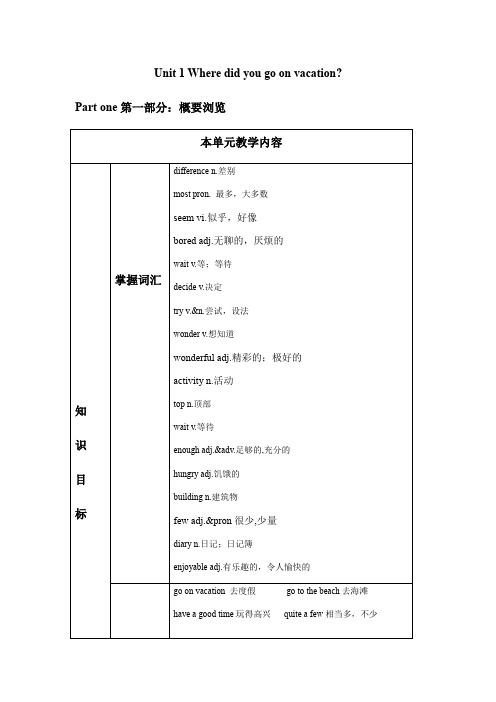
Unit 1 Where did you go on vacation? Part one第一部分:概要浏览Part two 第二部分;知识点详解单词与短语讲解(一)quite a few的用法a few 意为“一些,若干(=some)”,后跟可数名词复数形式。
quite a few 意为“相当多;不少(=many)”后跟可数名词复数形式。
We took ____ ____ _____ _____ in the park last weekend.上周末,我们在公园里拍了相当多的照片。
【拓展】few/a few/quite a few/little/a little/quite a little的用法1.most + 名词泛指多数,无范围most students大部分学生2.most + of + the (this/that/those/these等)+名词,指某一范围内的多数。
______ _____ _______students go to school by bike.这些学生们中的多数骑自行车去上学。
(三)seem的用法seem“好像”,既可以后跟___________,又可以后跟___________。
【活学活用】1.The pig seems ___________(healthy/ healthily).2.Tom seemed ___________(know/ to know) the test result.3.I seem __________( have) a cold【拓展】1.It seems + that从句看起来好像…;似乎….It seems that he is happy.=He seems _____ _____ happy. 他似乎很快乐。
2.seem like ….好像,似乎….. It seems like a good idea. 它似乎好像一个好主意。
Unit1单词讲解人教版英语七年级下册(1)
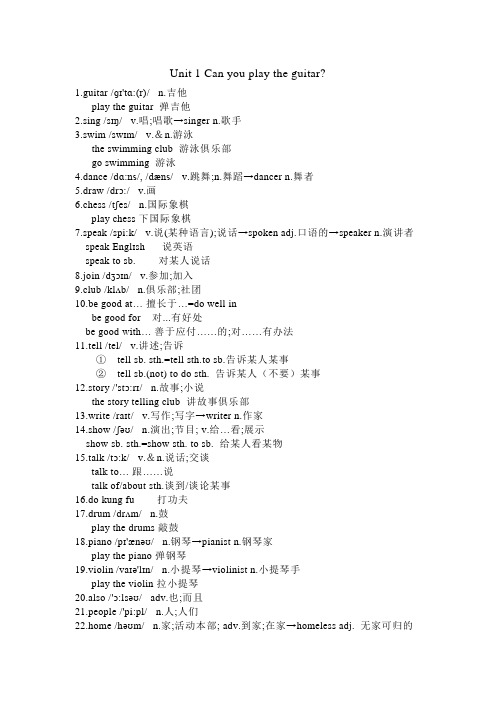
Unit 1 Can you play the guitar?1.guitar /ɡɪ'tɑ:(r)/ n.吉他play the guitar 弹吉他2.sing /sɪŋ/ v.唱;唱歌→singer n.歌手3.swim /swɪm/ v.&n.游泳the swimming club 游泳俱乐部go swimming 游泳4.dance /dɑ:ns/, /dæns/ v.跳舞;n.舞蹈→dancer n.舞者5.draw /drɔ:/ v.画6.chess /tʃes/ n.国际象棋play chess 下国际象棋7.speak /spi:k/ v.说(某种语言);说话→spoken adj.口语的→speaker n.演讲者speak Englɪsh 说英语speak to sb. 对某人说话8.join /dʒɔɪn/ v.参加;加入9.club /klʌb/ n.俱乐部;社团10.be good at…擅长于…=do well inbe good for 对...有好处be good with…善于应付……的;对……有办法11.tell /tel/ v.讲述;告诉①tell sb. sth.=tell sth.to sb.告诉某人某事②tell sb.(not) to do sth. 告诉某人(不要)某事12.story /'stɔ:rɪ/ n.故事;小说the story telling club 讲故事俱乐部13.write /raɪt/ v.写作;写字→writer n.作家14.show /ʃəʊ/ n.演出;节目; v.给…看;展示show sb. sth.=show sth. to sb. 给某人看某物15.talk /tɔ:k/ v.&n.说话;交谈talk to…跟……说talk of/about sth.谈到/谈论某事16.do kung fu 打功夫17.drum /drʌm/ n.鼓play the drums 敲鼓18.piano /pɪ'ænəʊ/ n.钢琴→pianist n.钢琴家play the piano 弹钢琴19.violin /vaɪə'lɪn/ n.小提琴→violinist n.小提琴手play the violin 拉小提琴20.also /'ɔ:lsəʊ/ adv.也;而且21.people /'pi:pl/ n.人;人们22.home /həʊm/ n.家;活动本部; adv.到家;在家→homeless adj. 无家可归的23.make /meɪk/ v.使成为;制造make friends 结交朋友make sb. do sth. 让某人做某事24.help (sb) with sth 在某方面帮助(某人)help sb.(to) do sth.帮助某人做某事25.center (=centre) /'sentə(r)/ n.中心;中央→central adj.中心的26.weekend /wi:k'end/, /'wi:kend/ n.周末on the weekend (在)周末=on weekends27.teach /ti:tʃ/ v.教;讲授teach sb. to do sth.教某人某事teach oneself 自学28.musician /mju:'zɪʃn/ n.音乐家【要点精析】1.join动词,意为“加入,参加”。
七下英语U1重点单词短语

七下英语U1重点单词短语1. Personal Information:- Name: The word "name" is used to refer to the unique identifier given to an individual.- Age: This word is used to indicate the number of years a person has lived. - Nationality: It refers to the country or nation to which a person belongs. - Address: The word "address" denotes the location where a person lives.- Phone number: It is a series of digits that can be used to contact a person through their phone.2. Greetings:- Hello: This is a common and polite way to greet someone.- Hi: Similar to "hello," "hi" is a casual way to greet someone.- Good morning/afternoon/evening: These phrases are used to greet someone based on the time of day.- How are you?: This question is used to inquire about a person's well-being. - Nice to meet you: It is a polite phrase used to express pleasure upon meeting someone for the first time.3. Classroom Language:- Teacher: This word is used to refer to the person who imparts knowledge to students.- Student: It refers to an individual who attends an educational institution to gain knowledge.- Lesson: This word indicates a particular topic or subject being taught in a class.- Homework: It is work assigned to students to be completed outside of school. - Exam: An examination or test taken by students to assess their knowledge and understanding.4. Family Members:- Mother: This word is used to refer to one's female parent.- Father: It denotes one's male parent.- Sister: A sister is a female sibling.- Brother: A brother is a male sibling.- Grandparents: This term is used to refer to the parents of one's parents.5. Hobbies:- Reading: The activity of looking at and understanding written words.- Listening to music: Engaging in the act of hearing and appreciating music. - Playing sports: Participating in physical activities that involve competition or skill.- Drawing: Creating images using various artistic materials.- Dancing: Moving rhythmically to music, usually in a coordinated sequence of steps.6. Daily Routine:- Wake up: The action of getting out of bed and starting the day.- Get dressed: Put on clothes appropriate for the day's activities.- Have breakfast: Eat the first meal of the day to provide energy for the morning.- Go to school: Travel to an educational institution to attend classes.- Do homework: Complete assigned tasks from school outside of class time.7. Weather and Seasons:- Sunny: Describes a day with clear skies and plenty of sunlight.- Cloudy: Characterizes a day with a covering of clouds in the sky.- Rainy: Refers to a day with precipitation in the form of rain.- Windy: Indicates a day with a significant amount of wind.- Snowy: Describes a day with snowfall and snow-covered ground.8. Describing Feelings:- Happy: Feeling pleasure or contentment.- Sad: Experiencing sorrow or unhappiness.- Angry: Feeling strong displeasure or hostility.- Excited: Feeling great enthusiasm or anticipation.- Bored: Feeling uninterested and restless due to a lack of stimulation.9. Asking for Directions:- Go straight: Proceed in a direct line without turning.- Turn left/right: Change direction to the left or right at an intersection. - Make a U-turn: Reverse direction by turning 180 degrees.- Pass by: Go past a certain point or location.- Reach: Arrive at a destination or goal.10. Food and Drinks:- Rice: A staple food in many cultures, made from boiled kernels of the rice plant.- Bread: A common food made from dough of flour and water, usually baked.- Meat: The edible flesh of an animal, typically a mammal or bird.- Fish: Edible flesh from fish, often consumed as seafood.- Fruit: Sweet and fleshy products of plants, usually eaten as a dessert or snack.- Water: A transparent, odorless, tasteless liquid that is essential for all known forms of life.- Juice: A drink made from the extracted liquid of fruits or vegetables.- Tea: A hot beverage made by infusing the dried leaves of the tea plant in hot water.- Coffee: A hot beverage made from the roasted and ground seeds of the coffee plant, often served with milk or sugar.。
初中英语七年级(下册)Unit 1词汇、句型精讲
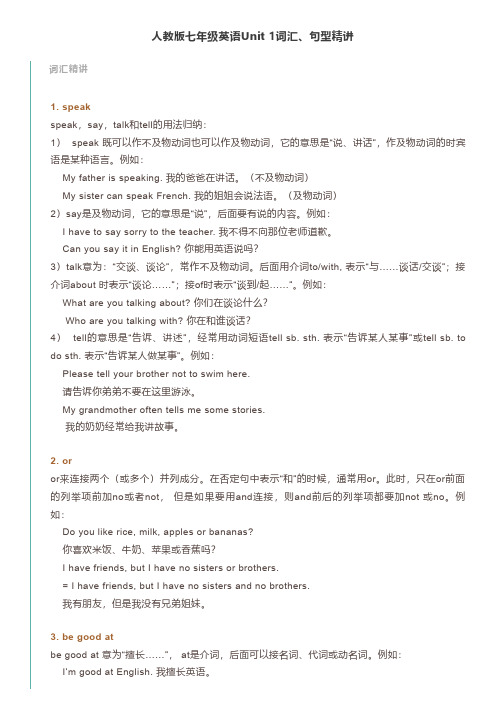
人教版七年级英语Unit 1词汇、句型精讲词汇精讲1. speakspeak,say,talk和tell的用法归纳:1) speak 既可以作不及物动词也可以作及物动词,它的意思是“说、讲话”,作及物动词的时宾语是某种语言。
例如:My father is speaking. 我的爸爸在讲话。
(不及物动词)My sister can speak French. 我的姐姐会说法语。
(及物动词)2)say是及物动词,它的意思是“说”,后面要有说的内容。
例如:I have to say sorry to the teacher. 我不得不向那位老师道歉。
Can you say it in English? 你能用英语说吗?3)talk意为:“交谈、谈论”,常作不及物动词。
后面用介词to/with, 表示“与……谈话/交谈”;接介词about 时表示“谈论……”;接of时表示“谈到/起……”。
例如:What are you talking about? 你们在谈论什么?Who are you talking with? 你在和谁谈话?4) tell的意思是“告诉、讲述”,经常用动词短语tell sb. sth. 表示“告诉某人某事”或tell sb. to do sth. 表示“告诉某人做某事”。
例如:Please tell your brother not to swim here.请告诉你弟弟不要在这里游泳。
My grandmother often tells me some stories.我的奶奶经常给我讲故事。
2. oror来连接两个(或多个)并列成分。
在否定句中表示“和”的时候,通常用or。
此时,只在or前面的列举项前加no或者not,但是如果要用and连接,则and前后的列举项都要加not 或no。
例如:Do you like rice, milk, apples or bananas?你喜欢米饭、牛奶、苹果或香蕉吗?I have friends, but I have no sisters or brothers.= I have friends, but I have no sisters and no brothers.我有朋友,但是我没有兄弟姐妹。
Unit+1单词讲解2023-2024学年人教版七年级英语下册+

1.guitar [ɡɪ'tɑ:(r)] n. 吉他o固定搭配:play the guitar 弹吉他o例句:He can play the guitar very well. 他吉他弹得很好。
2.sing [sɪŋ] v. 唱;唱歌o固定搭配:sing a song 唱一首歌o例句:She loves to sing in the shower. 她喜欢在洗澡时唱歌。
3.swim [swɪm] v. & n. 游泳o固定搭配:go swimming 去游泳o例句:I usually go swimming on the weekends. 我通常周末去游泳。
4.dance [dɑːns], [dæns] v. 跳舞n. 舞蹈o固定搭配:dance to the music 跟着音乐跳舞o例句:She is learning how to dance the tango. 她正在学习跳探戈。
5.draw [drɔː] v. 画o固定搭配:draw a picture 画画o例句:My little sister likes to draw cartoons. 我妹妹喜欢画卡通画。
6.chess [tʃes] n. 国际象棋o固定搭配:play chess 下国际象棋o例句:My grandfather taught me how to play chess. 我爷爷教我下国际象棋。
7.speak [spiːk] v. 说(某种语言);说话o固定搭配:speak English 说英语o例句:Can you speak any foreign languages? 你会说外语吗?8.join [dʒɔɪn] v. 参加;加入o固定搭配:join a club 加入俱乐部o例句:I want to join the school's basketball team. 我想加入学校的篮球队。
人教版七年级英语下册各单元单词表(含音标)
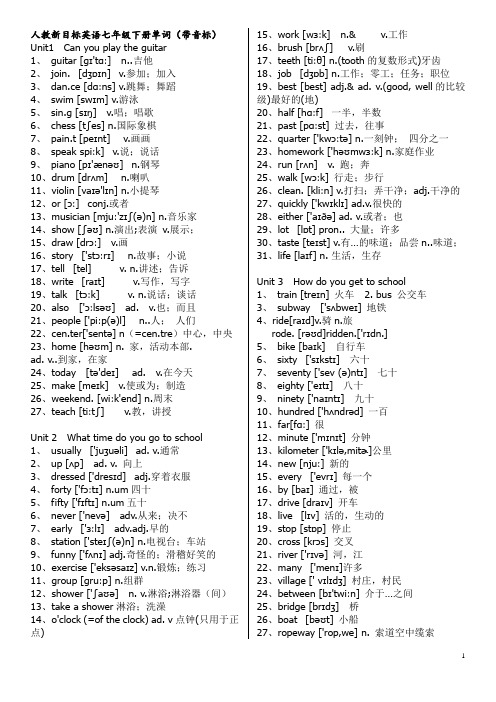
人教新目标英语七年级下册单词(带音标)Unit1 Can you play the guitar1、guitar [gɪ'tɑː] n..吉他2、join. [dʒɒɪn] v.参加;加入3、dan.ce [dɑːns] v.跳舞;舞蹈4、swim [swɪm] v.游泳5、sin.g [sɪŋ] v.唱;唱歌6、chess [tʃes] n.国际象棋7、pain.t [peɪnt] v.画画8、speak spiːk]v.说;说话9、piano [pɪ'ænəʊ] n.钢琴10、drum [drʌm] n.喇叭11、violin [vaɪə'lɪn] n.小提琴12、or [ɔː]conj.或者13、musician [mjuː'zɪʃ(ə)n] n.音乐家14、show [ʃəʊ] n.演出;表演v.展示;15、draw [drɔː] v.画16、story ['stɔːrɪ] n.故事;小说17、tell [tel] v. n.讲述;告诉18、write [raɪt] v.写作,写字19、talk [tɔːk]v. n.说话;谈话20、also ['ɔːlsəʊ] ad. v.也;而且21、people ['piːp(ə)l] n..人;人们22、cen.ter['sentə] n(=cen.tre)中心,中央23、home [həʊm] n. 家,活动本部.ad. v..到家,在家24、today [tə'deɪ] ad. v.在今天25、make [meɪk] v.使或为;制造26、weekend. [wiːk'end] n.周末27、teach [tiːtʃ] v.教,讲授Unit 2 What time do you go to school1、usually ['juʒuəli] ad. v.通常2、up [ʌp] ad. v. 向上3、dressed ['dresɪd] adj.穿着衣服4、forty ['fɔːtɪ] n.um四十5、fifty ['fɪftɪ] n.um五十6、never ['nevə] adv.从来;决不7、early ['ɜːlɪ] adv.adj.早的8、station ['steɪʃ(ə)n] n.电视台;车站9、funny ['fʌnɪ] adj.奇怪的;滑稽好笑的10、exercise ['eksəsaɪz] v.n.锻炼;练习11、group [gruːp] n.组群12、shower ['ʃaʊə] n. v.淋浴;淋浴器(间)13、take a shower淋浴;洗澡14、o'clock (=of the clock) ad. v点钟(只用于正点) 15、work [wɜːk] n.& v.工作16、brush [brʌʃ] v.刷17、teeth [tiːθ] n.(tooth的复数形式)牙齿18、job [dʒɒb] n.工作;零工;任务;职位19、best [best] adj.& ad. v.(good, well的比较级)最好的(地)20、half [hɑːf]一半,半数21、past [pɑːst] 过去,往事22、quarter ['kwɔːtə] n.一刻钟;四分之一23、homework ['həʊmwɜːk] n.家庭作业24、run [rʌn] v. 跑;奔25、walk [wɔːk] 行走;步行26、clean. [kliːn] v.打扫;弄干净;adj.干净的27、quickly ['kwɪklɪ] ad.v.很快的28、either ['aɪðə] ad. v.或者;也29、lot [lɒt] pron.. 大量;许多30、taste [teɪst] v.有…的味道;品尝n..味道;31、life [laɪf] n. 生活,生存Unit 3 How do you get to school1、train [treɪn] 火车 2. bus 公交车3、subway ['sʌbweɪ] 地铁4、ride[raɪd]v.骑n.旅rode. [rəʊd]ridden.['rɪdn.]5、bike [baɪk] 自行车6、sixty ['sɪkstɪ] 六十7、seventy ['sev (ə)ntɪ] 七十8、eighty ['eɪtɪ] 八十9、ninety ['naɪntɪ] 九十10、hundred ['hʌndrəd] 一百11、far[fɑː] 很12、minute ['mɪnɪt] 分钟13、kilometer ['kɪlə,mitɚ]公里14、new [njuː] 新的15、every ['evrɪ] 每一个16、by [baɪ] 通过,被17、drive [draɪv] 开车18、live [lɪv] 活的,生动的19、stop [stɒp] 停止20、cross [krɔs] 交叉21、river ['rɪvə] 河,江22、many ['menɪ]许多23、village [' vɪlɪdʒ] 村庄,村民24、between [bɪ'twiːn] 介于…之间25、bridge [brɪdʒ] 桥26、boat [bəʊt] 小船27、ropeway ['rop,we] n. 索道空中缆索28、year [jɪə] n. 年;年度;岁29、afraid [ə'freɪd] 害怕;惧怕30、like [laɪk] 像;怎么样(介词)31、leave [liː v]离开;left (lea ve的过去式)32、dream [driːm]梦想;睡梦33、true[truː]真的;符合实际的Unit 4 Don’t eat in class1、rule[ruːl]规则;规章2、arrive [ə'raɪv] 到达3、hallway ['hɔːlweɪ] 走廊;过道4、hall [hɔːl]大万礼堂5、listen ['lɪs(ə)n]听;倾听6、fight [faɪt] 打架;战斗7、sorry ['sɒrɪ]抱歉的;难过的;惋惜的8、outside [aʊt'saɪd] ad. v.在外面adj.外面的9、wear [weə] 穿;戴10、important [ɪm'pɔːt(ə)nt] 重要的11、bring [brɪŋ]带来;取来12、player ['pleɪə]播放机;运动员13、uniform ['juːnɪfɔːm]校服;制服14、quiet ['kwaɪət] 安静的15、out [aʊt] 外出16、dish [dɪʃ] 碟;盘dishes17、night [naɪt] 晚上18、before [bɪ'fɔː]prep.conj在…以前ad v.以前19、dirty ['dɜːtɪ] 脏的20、kitchen ['kɪtʃɪn] 厨房21、more [mɔː]更多的22、noisy ['nɒɪzɪ] 吵闹的23、relax [rɪ'læks] 放松;休息24、read [riːd]读;阅读25、terrible['terɪb(ə)l] 非常讨厌的;可怕的26、feel [fiːl] 感受;觉的27、strict [strɪkt] 严格的;严厉的28、remember [rɪ'membə] 记住;记起29、follow ['fɒləʊ] 遵循;跟随30、luck [lʌk] 幸运;运气31、keep [kiːp]保持;保留32、hair [heə] 头发;毛发33、learn [lɜːn] 学习;学会Unit 5 What do you like pandas1、tiger ['taɪgə] n.老虎2、elephan.t ['elɪf(ə)n.t] n. 大象3、koala [kəʊ'ɑːlə]n. 树袋熊4、panda ['pændə] n. 熊猫5、lion ['laɪən] n.狮子6、giraffe [dʒə'rɑ:f]n. 长颈鹿7、cute [kjuːt]adj可爱的;机灵的8、lazy ['leɪzɪ] 懒散的;懒惰的9、smart [smɑːt] adj 聪明的10、beautiful ['bjuːtɪfʊl] adj 美丽的;美好的11、scary ['skeərɪ] adj吓人的;恐怖的12、kind [kaɪn.d] n. 种类13、Australia [ɒ'streɪlɪə] n. 澳大利亚14、south [saʊθ] adj 南方的n. 南;南方15、Africa ['æfrɪkə] n.非洲16、pet [pet] n. 宠物17、leg [leg] n. 腿18、cat [kæt] n. 猫19、sleep [sliːp] n.睡觉20、animal ['ænɪm(ə)l] n. 动物21、friendly ['fren(d)lɪ] adj 友好的22、shy [ʃaɪ] adj 羞怯的;腼腆的23、save [seɪv] v. 救;救助24、symbol ['sɪmb(ə)l] n.象征25、flag [flæg]n. 旗;旗帜26、forget [fə'get] v.忘记;旗杆27、place [pleɪs] n. 地点;位置28、water ['wɔːtə] n.水29、danger ['deɪn(d)ʒə] n. 危险30、cut [kʌt] v. 砍;切31、down [daʊn] ad. v.(坐躺倒)下32、tree [triː] n. 树33、kill [kɪl] v.杀死;弄死34、ivory ['aɪv(ə)rɪ] n.象牙35、over ['əʊvə] prep. 超过;多于在… 上方36、zoo [zuː] n.动物园Unit6 I’m watching TV1、newspaper ['n.juːzpeɪpə] n.报纸2、use [juːz] v.使用;运用3、soup [suːp] n.汤4、wash [wɒʃ] v.洗5、movie ['muːvɪ] n.电影6、just [dʒʌst] adv. 只是;恰好7、house [haʊs] n.房子8、drin.k [drɪŋk]v.喝n..饮料9、tea [tiː]n.茶;茶叶10、tomorrow [tə'mɒrəʊ] ad. v.在明天11、pool [puːl]n.(复数pools)游泳池12、shop [ʃɒp] v.购物13、supermarket ['suːpəmɑːkɪt]n. 超市14、man [mæn] n.男人;人15、host [həʊst] n.主人;东道主16、study ['stʌdɪ] v. n.学习;研究17、state [steɪt] n. 洲18、the United States [ði juˈnaɪtɪd stets]美国;美利坚合众国19、American adj美国的;美洲的n.美国人;美洲人20、dragon ['dræg(ə)n] n.龙21、young [jʌŋ]幼小的,年轻的22、race [reɪs] 竞赛23、any ['enɪ] 任何一个.任一的24、other ['ʌðə] adj另外的25、children ['tʃɪldrən] n. 儿童26、miss [mɪs] 怀念.思念27、wish [wɪʃ] v. 希望28、delicious [dɪ'lɪʃəs] adj 可口的.美味的29、still [stɪl] ad. v. 还.仍然30、living room ['lɪvɪŋ ru:m]客厅Unit 7 It's raining!1、rain [reɪn] 下雨;雨水2、windy ['wɪndɪ] 多风的3、cloudy ['klaʊdɪ] 多云的4、sunny ['sʌnɪ] 晴朗的5、snow [snəʊ]下雪;雪Snow6、weather ['weðə] 天气7、cook [kʊk] 做饭8、bad [bæd] 坏的;糟的9、park [pɑːk]公园10、message ['mesɪdʒ]信息;消息11、take a message捎个口信;传话12、him他(he的宾格)13、could[kʊd] 能;可以14、back [bæk] 回来;回原处15、call(sb)back回电话16、problem ['prɒbləm] 困难;难题17、again [ə'gen; ə'geɪn] 再一次;又一次18、dry [draɪ]干燥的19、cold [kəʊld] 寒冷的;冷的20、hot [hɒt] 热的21、warm [wɔːm]温暖的22、visit ['vɪzɪt] 拜访;参观23、Canada ['kænədə]加拿大24、summer ['sʌmə] 夏天;夏季25、sit [sɪt] 坐26、juice [dʒuːs]果汁;饮料27、soon [suːn]不久;很快28、vacation [və'keɪʃ(ə)n] 假期29、on (a) vacation 度假30、hard [hɑːd]努力地;困难的31、Europe ['jʊrəp] 欧洲32、mountain ['maʊntɪn] 高山33、country ['kʌntrɪ] 国;国家34、skate [skeɪt] 滑冰35、snowy ['snəʊɪ] 下雪的36、winter ['wɪntə] 冬天;冬季37、Russian ['rʌʃ(ə)n]俄罗斯的;俄罗斯人;俄语38、snowman ['snəʊmæn]雪人39、rainy ['reɪnɪ] 阴雨的;多雨的40、Joe [dʒəʊ] 乔41、Jeff [dʒef] 杰夫42、Moscow ['mɔskəʊ] 莫斯科43、Toronto [tə'rɑnto] n. 多伦多44、Boston ['bɔstən] 波士顿Unit 8 Is there a post office n.ear here?1、post [pəʊst] 邮政2、office['ɒfɪs] 办公室3、post office邮局4、police [pə'liːs]警察5、police station ['steɪʃən] 警察局6、hotel [həʊ'tel] 旅店;酒店7、restaurant ['restrɒnt] 餐馆8、bank [bæŋk]银行9、hospital ['hɒspɪt(ə)l]医院10、street [striːt]大街11、pay [peɪ] 付费12、payphone ['peifəun] 付费电话13、near[nɪə] 在……附近14、across [ə'krɒs] 过;穿过15、across from在……对面16、front [frʌnt] 前面17、in front of在……前面18、behind [bɪ'haɪnd] 在……后面19、town [taʊn]镇;市镇20、around [ə'raʊnd] 到处;大约21、north [nɔːθ]北;北方;北方的22、along [ə'lɒŋ]沿着23、go along沿着(这条街)走24、turn [tɜːn]转向;翻25、right [raɪt] 向右边;右边26、left [left] 向左边;左边27、rurn right向右、左转28、crossing ['krɒsɪŋ]十字路口29、neighborhood ['neɪbə,hʊd] 街区;街坊30、spend [spend] 花(时间、钱等)31、spend time花时间32、climb [klaɪm]爬33、road [rəʊd] 路34、often ['ɒf(tə)n] 时常;常常35、air [eə] 空气36、sun shine阳光37、free [friː]免费的38、enjoy [ɪn'dʒɒɪ] 享受;喜爱39、enjoy reading['riːdɪŋ]喜欢阅读40、easily ['iːzɪlɪ] 容易地41、money ['mʌnɪ] 钱Unit 9 What does he look like?1、curly ['kɜːlɪ]卷曲的2、straight [streɪt] 直的3、tall [tɔːl] 高的4、medium ['miːdɪəm] 中等的5、height [haɪt] 身高;高度6、of medium height中等身高7、thin [θɪn] 瘦的8、heavy ['hevɪ] 重的9、build [bɪld] 身材10、of medium build中等身材11、tonight [tə'naɪt] 今夜12、little ['lɪt(ə)l] 小的13、a little一点,少量14、cinema['sɪnɪmə] 电影院15、glasses ['glɑːsɪz] 眼镜16、later ['leɪtə] 以后17、handsome ['hæns(ə)m] 英俊的18、actor ['æktə] 演员19、actress['æktrɪs] 女演员20、person ['pɜːs(ə)n]人21、nose [nəʊz] 鼻子22、blonde [blɒnd] adj. 金黄色的23、mouth [maʊθ]嘴24、round [raʊnd]圆形的25、face [feɪs] 脸26、eye [aɪ] 眼睛27、singer ['sɪŋə(r)] 歌手28、artist ['ɑːtɪst] 艺术家29、crime [kraɪm] 犯罪活动30、criminal ['krɪmɪn(ə)l] 犯罪31、put [pʊt] 放32、each [iːtʃ] 每个,各自33、way [weɪ] 方式,路线34、describe [dɪ'skraɪb] 描述35、differently ['dɪfərəntlɪ] 不同的36、another[ə'nʌðə] 另一,又一37、end [end] 结尾,尽头38、in the end最后39、real [riːl]真正的40、jeans [dʒinz] 牛仔裤41、Johnny ['dʒɒnɪ] 约翰尼42、Dean [din] 迪安43、Tina ['tinə]蒂娜44、Jackson ['dʒæksn] 杰克逊Unit 10 I'd like some noodles1、noodle ['nuːd(ə)l] 面条2、mutton ['mʌt(ə)n] 羊肉3、beef [biːf] 牛肉4、cabbage [ˈkæbɪdʒ] 卷心菜;洋白菜5、potato [pə'teɪtəʊ] 土豆;马铃薯6、special ['speʃ(ə)l] 特色菜;特价品;特别的;特殊的7、would [wʊd; wəd] (表示意愿)愿意8、would like愿意;喜欢9、yet(常用于否定句或疑问句)还;仍然10、large[lɑːdʒ]大号的;大的11、order ['ɔːdə] 点菜;命令12、take one's order点菜13、size [saɪz] 大小;尺码14、bowl[bəʊl] 碗15、one(large)bowl of一(大)碗16、tofu ['təʊfuː] 豆腐17、meat [miːt](可食用的)肉18、dumpling ['dʌmplɪŋ]饺子19、porridge ['pɒrɪdʒ] 粥;面糊20、onion ['ʌnjən] 洋葱21、fish [fɪʃ] 鱼;鱼肉22、pancake ['pænkeɪk]烙饼;薄饼23、world [wɜːld]世界24、around [ə'raʊnd] the world世界各地25、answer ['ɑːnsə]答案;回答26、different ['dɪf(ə)r(ə)nt]不同的27、cake [keɪk] 蛋糕28、candle ['kænd(ə)l] 蜡烛29、age [eɪdʒ] 年龄30、make a wish [wɪʃ] 许愿31、blow [bləʊ] 吹32、blow out吹灭33、if如果34、will [wɪl] 会35、the UK(等于the United Kingdom)英国35、candy ['kændɪ] 糖果37、lucky幸运的38、popular受欢迎的;普遍的39、get popular受欢迎;流行40、cut up切碎41、idea [aɪ'dɪə] 想法;主意42、bring good luck[lʌk] to…给……带来好运Unit11 How was your school trip?1、milk [mɪlk] 挤奶2、cow[kaʊ] n. 奶牛,母牛3、milk a cow给奶牛挤奶4、horse [hɔːs]马5、ride [raɪd] a horse骑马6、feed [fiːd] 喂养;饲养7、feed chickens ['tʃɪkɪns] 喂鸡8、farmer ['fɑːmə] 农民;农场主9、quite [kwaɪt] 相当;安全10、quite a lot(of…) 许多11、anything ['enɪθɪŋ](常用于否定句或疑问句)任何东西;任何事物12、grow [grəʊ] 种植;生长;发育13、farm [fɑːm] 农场;务农;种田14、pick [pɪk] 采;摘15、excellent ['eks(ə)l(ə)nt]极好的;优秀的16、countryside ['kʌntrɪsaɪd] 乡村;农村17、in the countryside在乡下;在农村18、yesterday ['jestədeɪ; -dɪ] 昨天19、flower ['flaʊə] 花20、worry ['wʌrɪ] 担心;担忧21、luckily ['lʌkɪlɪ] 幸运地;好运地22、sun [sʌn] 太阳23、museum [mjuː'zɪəm] 博物馆24、fire ['faɪə] 火灾25、fire station ['steɪʃ(ə)n] 消防站26、painting ['peɪntɪŋ]油画;绘画27、exciting [ɪk'saɪtɪŋ; ek-]使人兴奋的;令人激动的28、lovely ['lʌvlɪ] 可爱的29、expensive [ɪk'spensɪv; ek-] 昂贵的30、cheap[tʃiːp] 廉价的;便宜的31、slow [sləʊ] 缓慢的;迟缓的32、fast [fɑːst] 快地(的)33、robot ['rəʊbɒt] 机器人34、guide [gaɪd] 导游;向导35、gift [gɪft] 礼物;赠品36、all in all总的说来37、everything ['evrɪθɪŋ]一切;所有事物38、interested ['ɪnt(ə)rɪstɪd] 感兴趣的39、be interested in对……感兴趣40、dark [dɑːk] 黑暗的;昏暗的41、hear(heard) [hɪə] 听到;听见42、Carol ['kær(ə)l] 卡罗尔Unit12 What did you do last weekend?1、camp [kæmp]扎营2、lake [leɪk] 湖,湖泊3、beach [biːtʃ] 海滩,沙滩4、badminton ['bædmɪnt(ə)n] 羽毛球运动5、sheep [ʃiːp]羊,绵羊6、as [æz; əz] 作为,当做7、natural['nætʃ(ə)r(ə)l] adj. 自然的8、butterfly蝴蝶9、tired [taɪəd] 疲倦的10、stay [steɪ] 停留11、stay up late深夜不留12、away [ə'weɪ] 离开13、run away跑开14、mouse [maʊs] 老鼠15、baby ['beɪbɪ] 幼小的16、shout [ʃaʊt] 呼叫,喊叫17、shout at…冲……大声叫嚷18、woof [wʊf] (狗叫声)汪汪19、language ['læŋgwɪdʒ] 语言20、fly [flaɪ] 飞21、kite [kaɪt] 风筝22、fly a kite放风筝23、high [haɪ] 高的(地)24、high school中学25、ago [ə'gəʊ] 以前26、India ['ɪndɪə] 印度27、tent [tent] 帐篷28、put up搭起,举起29、moon月亮30、surprise [sə'praɪz] 惊奇,惊讶31、get a surpris吃惊32、snake [sneɪk] 蛇33、scared [skeəd] 惊慌的34、move [muːv]移动35、shout to…对……大声喊叫36、start [stɑːt]开始,着手37、jump [dʒʌmp] 跳跃38、up and down上上下下39、wake [weɪk] 弄醒,醒40、into ['ɪntʊ; 'ɪntə] 到……里面41、forest ['fɒrɪst] 森林42、ear [ɪə] 耳朵43、Lucy ['lusi] 露西。
七年级下册英语译林版第一单元单词
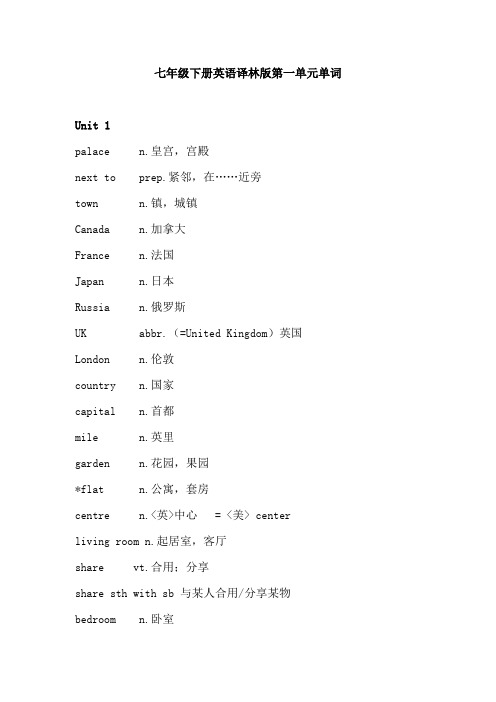
七年级下册英语译林版第一单元单词Unit 1palace n.皇宫,宫殿next to prep.紧邻,在……近旁town n.镇,城镇Canada n.加拿大France n.法国Japan n.日本Russia n.俄罗斯UK abbr.(=United Kingdom)英国London n.伦敦country n.国家capital n.首都mile n.英里garden n.花园,果园*flat n.公寓,套房centre n.<英>中心 = <美> centerliving room n.起居室,客厅share vt.合用;分享share sth with sb 与某人合用/分享某物bedroom n.卧室own adj.自己的bathroom n.浴室,盟洗室*balcony n.阳台beach n.海滩sea n.海dining room n.餐厅zero num.零hundred num.百thousand num.千million num.百万foot n.(pl.feet)英尺square adj.平方的metre n.<英>米,公尺 = <美> menter area n.面积over prep.超过fork n.叉,餐叉fridge n.(=refrigerator)冰箱knife n.(pl.knives)刀*lamp n.灯,台灯shower n.淋浴器;淋浴sofa n.沙发video n.录像;视频be full of 满是of one’s own 属于某人自己的some day 将来有一天,总有一天may modalv.可以;也许,可能message n.消息,音信take a message 传个话,捎个口信call sb back 回电话double adj.双的,两倍的study n.书房machine n.机器washing machine n.洗衣机at the foot of 在……脚下field n.地,田football field n.足球场home cinema n.家庭影院invite vt.邀请stay vi.停留,逗留。
Unit 1 第1课时 课本讲解及词汇拓展-七年级英语下册(牛津上海版)
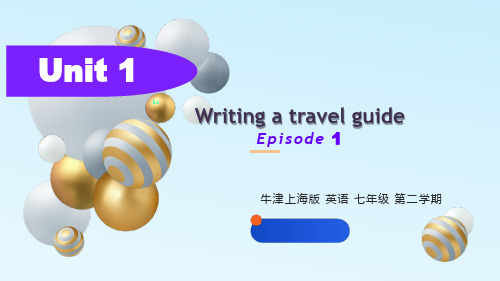
11. therefo re adv. 因此,所以 I was ill, and therefore could
not attend the conference. He has broken his leg and therefore he can't walk. 他摔坏了腿,因此走不了路。指点迷 津:therefore 与 so 两词同义,但词性不同:前者是副词, 而后者是连词。在用法上举例如下: It rained. Therefore,
7. century n. 世纪 It was built in the 19th century. 它建于19世纪。 【拓展】 century n. 百年:This book was written centuries ago.
8. techn o lo gy n. 科技;工艺;工程技术 The
we didn't have the match. =It rained, so we didn't have the
match.
12. surp risin g ad j. 令人惊奇的 It is surprising that he made friend with the stranger immediately. 【拓展】 surprise v.使吃惊;使感到意外 The news surprised us all. surprise n. 吃惊:To my surprise, the plan succeeded. surprised adj. 感到惊讶的 He was surprised that his father
her vacation touring Italy.
3. reaso n n. 原因,理由 The reason why
- 1、下载文档前请自行甄别文档内容的完整性,平台不提供额外的编辑、内容补充、找答案等附加服务。
- 2、"仅部分预览"的文档,不可在线预览部分如存在完整性等问题,可反馈申请退款(可完整预览的文档不适用该条件!)。
- 3、如文档侵犯您的权益,请联系客服反馈,我们会尽快为您处理(人工客服工作时间:9:00-18:30)。
新目标英语七年级下册Unit 1知识点总结Unit 1 Can you play the guitar?短语1. play chess 下国际象棋2. play the guitar 弹吉他3. speak English 说英语4. English club 英语俱乐部5. talk to 跟…说6. play the piano 弹钢琴7. play the drums 敲鼓8. make friends 结交朋友9. tell stories 讲故事10. play games 做游戏11. on the weekends (在)周末1. play +棋类/球类 下……棋,打……球2. be good at doing sth.= do well indoing sth. 擅长做某事3. be good with sb. 善于与某人相处4. need sb. to do sth. 需要某人做某事5. can + 动词原形 能/会做某事6. a little + 不可数名词 一点儿……7. join the …club 加入…俱乐部8. like to do sth. =love to do sth.喜欢/喜爱做某事9. like doing sth.喜欢做某事10. show sth to sb = show sb sth“把某物给某人看”【经典例句】He likes playing the guitar.他喜欢弹吉他。
【考点聚焦】guitar为一种乐器,注意play与表示乐器的名词连用时,名词前要加定冠词the。
【活学活用】1.选择The boys often play guitar in afternoon.A.the;/B./;theC.the;theD./;/答案:C【巧记提示】chess(国际象棋)→cherr(欢欣)【经典例句】I am good at playing chess.我擅长下象棋。
【考点聚焦】一定注意“下棋”用play chess,而不用play the chess。
【活学活用】 4.选择I like to play piano and he likes to playchess.A.the;theB.the;/C./;theD./;/答案:B【巧记提示】s+peak(顶点)【经典例句】Can you speak English?你会说英语吗?【考点聚焦】1)派生词:speaker n. 说话者;演讲者speech n. 说话;演讲2)注意区分:speak,say,talk和tell①say指用语言表达思想,着重说话的内容或强调说话这一动作,不表示说话的性质。
②speak强调说话的动作、声音,而不强调内容。
在正式场合表示发言、演讲,说某种语言用speak。
③talk表示两个人或多个人在一起讲话、谈论(多指随意谈论)。
④tell的意思是“告诉,讲述,吩咐”,讲故事或讲笑话多用tell。
【活学活用】5.选择—What does he ?Can you me?—Sorry,I don’t know.A.say;tellB.speak;talkC.speak;tellD.say;talk答案:A【巧记提示】little(少许的)→bottle(瓶子)【经典例句】He is little known to the villagers.村里几乎没人认识他。
【考点聚焦】1)little还有“小的,小巧的”之意,带有小的可爱之意。
2)注意little与a little 的区别:little与a little都可表示数量,修饰不可数名词。
但little表示否定意义,而a little表示肯定意义。
Silence is like sleep which refreshes wisdom.缄默像睡眠;它使智慧焕然一新。
【活学活用】7.翻译句子我会说一点英语。
答案:I can speak a little English.短语·典句·考点help sb.with sth. 在……方面帮助某人【经典例句】Could you help me with my English?你能帮我学英语吗?【考点聚焦】在help sb.with sth.结构中,with是介词,故后面要跟名词或动名词作宾语。
该结构相当于help sb.do sth.。
【活学活用】8.同义句转换I often help him do his homework.I often help him his homework.答案:withbe good with... 与……相处得好;与……合得来【经典例句】He is very good with children.他与孩子们很合得来。
【考点聚焦】1)同义词组:get on well with2)注意与be good...的其他词组意思的差别:be good at意为“擅长做某事”;be good for意为“对……有益处”。
句子·剖析·拓展Can you play the guitar?你能弹吉他吗?【剖析】Can you...?用来询问对方能否做某事,意思是“你能/会……吗?”,肯定回答用“Yes,I can.”否定回答用“No,I can’t.”【拓展】can(能、会),may(可以;可能),must(必须)都是情态动词,后面跟动词原形。
其否定结构在后面加上not,can not通常缩写为can’t;must not缩写为mustn’t;may not一般不缩写。
Can you play the piano,the trumpet,the drums,or the guitar?你会弹奏钢琴,吹喇叭,敲鼓,或者弹吉他吗?【剖析】此句为简单的选择疑问句,即提问者提供两种或两种以上情况,让对方从中作出选择的句子。
它的基本结构是:一般疑问句+or+一般疑问句(后一部分与前一部分相同的成分常常省略)。
or连接的是两个并列的成分,要求词性一致。
【拓展】1)回答时,不用yes或no,而是选择其中一种回答。
2)在读法上,or的前一部分用升调,后一部分用降调。
语法·聚焦一、情态动词can的用法:1.表示能力,通常指在体力或脑力方面的能力,意为“能;会”。
如:He can speak English.他会说英语。
2.表示许可,意为“可以”,这时可以和may通用,但是比may较正式。
如:Can I use your pen?我可以用你的钢笔吗?3.表示可能性,意为“可能”,这时常出现在否定句中。
如:It can’t be true.这不可能是真的。
4.表示提供帮助。
如:Can you help me?你可以帮助我吗?二、动词play的用法: play games with sb 与某人做游戏(1).play+西方乐器名词,乐器名词前要加the,“play + the+ 乐器”“弹奏某种乐器”。
play the guitar弹吉他 play the piano 弹钢琴 play the drums 敲鼓play the violin 拉小提琴 play the trumpet吹喇叭(2).play加球棋牌时,球棋牌前不加the,“play +球类名词”表示“踢、打某种球”。
play ping-pong打乒乓球 play football/soccer踢足球play basketball打篮球 play baseball 打棒球 play volleyball打排球play chess 下国际象棋 play cards 打牌(3). play with+玩具/其他名词 He can play with a ball.三、be good(1).be good at (doing) sth 擅长…精通…(2).be good with sb/sth 善于应付/相处…的,对…有办法(3).be good for sb/sth 对…有益处四、jion的用法(1).join是动词,意为“参加,加入”,后面接表示团体、俱乐部或组织的词作宾语,意为“加入某种团体、俱乐部或组织,并成为其中的一员”。
join the music/swimming/chess/art club 加入音乐/游泳/围棋/美术俱乐部①若想表示加入某项活动、聚会、比赛等时,要加介词in。
join ina game②join还可以用于“join sb ( in doing sth)”,意为“加入到某人中(一起做某事)”。
(2).对俱乐部的名称进行提问时,疑问词用What club,如:I want to join the art club.对划线部分进行提问时,答案是:What clubdo you want to join?基础巩固一、.单项选择( )1. Can you ______ English?A. speakB. talkC. sayD. tell( )2. --- ________ can you play?--- The drums.A. WhenB. HowC. WhatD. Where( )3. --- ______ you sing?--- Yes, I can.A. DoB. CanC. AreD. Am( )4. I want to ______ the chess club.A. joinB. join inC. join toD. join for( )5. Tom wants ________ to you. Are you free?A.to tell B.tells C.to talk D.talks ( )6. Can you help me with _______?A. danceB. dancingC. dancesD. to dance( )7. My brother _______ the trumpet and he play it _____ .A. can plays, goodB. can’t play, g oodC. can play, wellD. doesn’t play, well( )8. Her sister can play ______ piano, but she can’t play _____ basketball.A. the; theB. /; theC. the; /D. /; /( )9. My brother can play the guitar,______ he can’t play it very well.A. andB. soC. orD. but( ) 10. ---- Can you play volleyball?--- Sorry, I ______.A. don’tB. doC. can’tD. can( )11.Please call me ________ 8989766.A.in B.at C.about D.with二、填空(1).用good或well 填空1.He is a ________ student; he is ________ and studies________.2. The food smells ________ and it sells ________.(2).使用适当的介词填空1. Running is good________ a man's health.2. Parents aren't always good ________ their children3. If you are not good _________ driving, you'd better keep the car away. (3).使用所给词的适当形式填空1. The book is very ____________ (interest).2. I need a__________ (relax) holiday.3. Are you __________ (interest) in music?4. He doesn't feel __________ (relax) when he is at work.三、根据汉语意思完成下列句子,每空一词。
